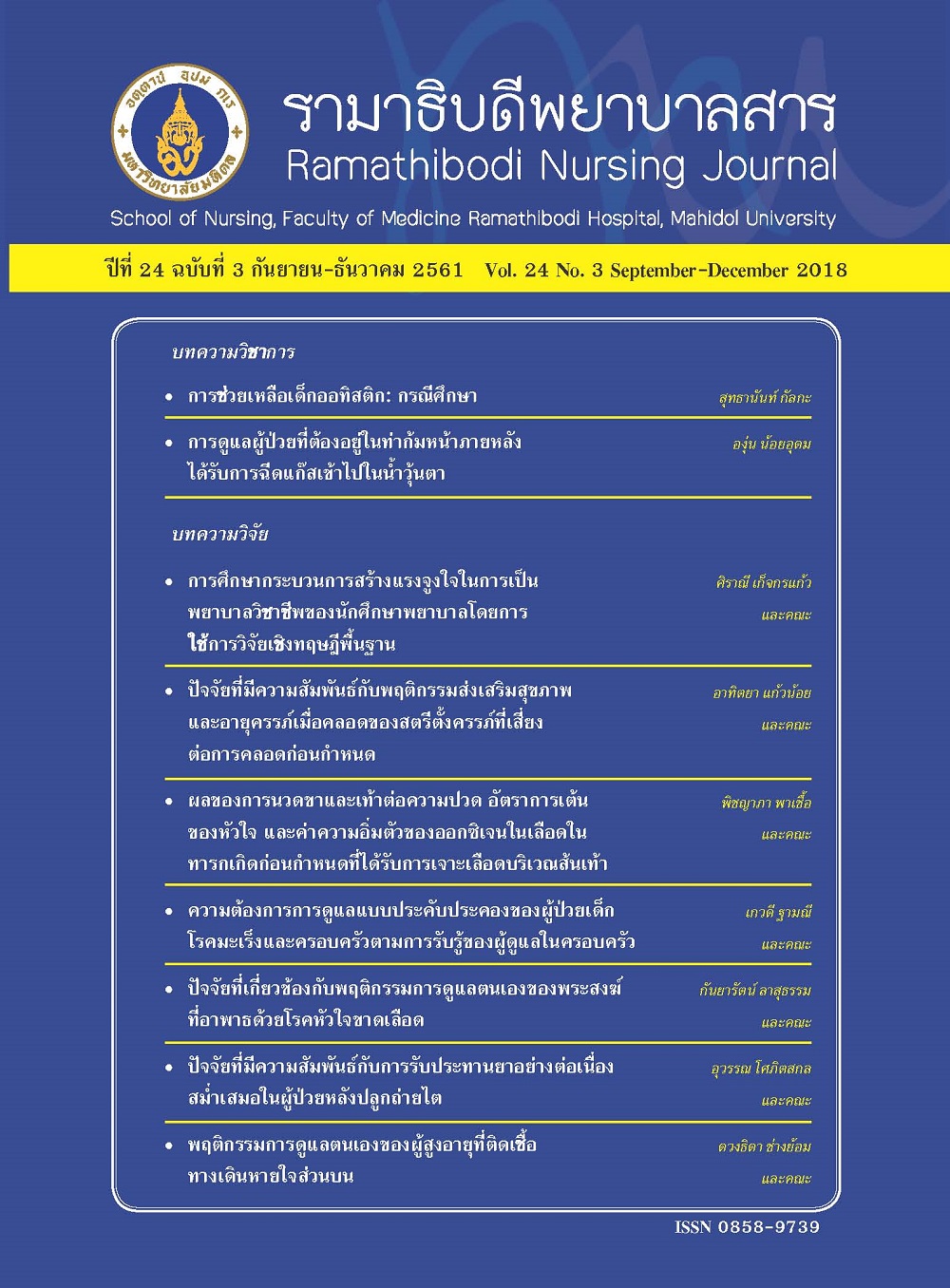Motivation Process for Becoming Professional Nurse in Nursing Students: A Grounded Theory
Main Article Content
Abstract
The purpose of this study was to explore the motivation process in nursing students to be professional nurses. A qualitative methodology based on a grounded theory research was employed. The data was collected by means of observation and in-depth interviews with 25 nursing students, 6 males and 19 females, aged between 19–22 years who have clinical practice experience. The core category emerging from data analysis was motivation process for becoming professional nurse, which had subcategories: initial motivation to study nursing, encountering with clincal experience, and determining the goal of nursing study. In all of these process, the rise or drop of students’ motivation were affected by the factor on students’ changes of attitude and behavior to maintain their motivation throughout their study. Such increase and decrease of motivation is a dynamic and fluctuating process. The current results could guide the instruction and course management of nursing education in order to meet the needs of nursing students. Specifically, it provided a basis for those instructors to realize about their crucial role in motivating nursing students. The knowledge on an approach to giving positive feedback to students is another important strategy.
Keywords: Motivation process, Nursing students, Professional nurses
Article Details
บทความ ข้อมูล เนื้อหา รูปภาพ ฯลฯ ที่ได้รับการตีพิมพ์ในรามาธิบดีพยาบาลสาร ถือเป็นลิขสิทธิ์ของวารสาร หากบุคคลหรือหน่วยงานใดต้องการนำทั้งหมดหรือส่วนหนึ่งส่วนใดไปเผยแพร่หรือเพื่อกระทำการใด ใด จะต้องได้รับอนุญาตเป็นลายลักษณ์อักษรจากรามาธิบดีพยาบาลสารก่อนเท่านั้น
References
2. Joseph E. Importnace of nurses in the health care settings. Int J Sci Res. 2015;4(11):325-7.
3. Srisuphan WaS, K. Recommended policy-based solutions to shortage of registered nurses in Thailand. Thai Journal of Nursing Council. 2012;27(1):5-12. (in Thai)
4. Bronson S. Autonomy support environment and autonomous motivation on nursing student academic performance: an exploratory analysis. Nurse Educ Today. 2016;44:103-8.
5. Khunthar A. The impacts and solutions to nursing workforce shortage in Thailand. J Nurs Sci. 2014;32(1):81-90. (in Thai)
6. The Secretariat of the Cabinet [Internet]. Bangkok: The government; 2013 [update 2013 May 15; cited 2018 Aug 2].Available from: http://www.cabinet.soc.go.th/soc/Program2-3.jsp?top_serl=99307592&key_ word=&owner_dep=&meet_date_dd=&meet_date_mm=&meet_date_yyyy=&doc_id1=12503&doc_id2=2556&meet_date_dd2= &meet_date_mm2=&meet_date_yyyy2= (in Thai)
7. Rispel LC. Special issue: transforming nursing in South Africa. Global Health Action. 2015;8:10.3402/gha.v8.28205. doi:10.3402/gha.v8.28205
8. Karimi S, Haghani F, Yamani N, Najafi Kalyani M. A qualitative inquiry into nursing students’ experience of facilitating reflection in clinical setting. The Scientific World Journal. 2017;2017:6293878. doi:10.1155/ 2017/6293878.
9. McLaughlin K, Moutray M, Moore C. Career motivation in nursing students and the perceived influence of significant others. J Adv Nurs. 2010;66(2):404-12.
10. Tseng H-C, Wang H-H, Weng W-C. Nursing students’ perceptions toward the nursing profession from clinical practicum in a baccalaureate nursing program- a qualitative study. The Kaohsiung Journal of Medical Sciences. 2013;29(3):161-8.
11. Ramathibodi School of Nursing, Faculty of Medicine Ramathibodi hospital, Mahidol University. Self report of the Bachelor of Nursing curriculum in acedemic year 2016. 2016. (in Thai)
12. Faculty of Nursing, Ubon Ratchathani University. Report the results of the Bechelor of Nursing Science Program in academic year 2014. [Internet].[update 2015 May 30; cited 2018 Aug2]. Available from: http:http://www.ubu.ac.th/web/files_up/09f2015050816451180.pdf (in Thai)
13. Pitt V, Powis D, Levett-Jones T, Hunter S. Factors influencing nursing students’ academic and clinical performance and attrition: an integrative literature review. Nurse Educ Today. 2012;32(8): 903-13.
14. Rahimi A, Ahmadi F. The obstacles and improving strategies of clinical education from the viewpoints of clinical instructors in Tehran’s nursing schools. Iranian Journal of Medical Education. 2005;5(2):73-80.
15. Hanifi N, Parvizy S, Joolaee S. Motivational journey of Iranian bachelor of nursing students during clinical education: a grounded theory study. Nurs Health Sci. 2013;15(3):340-5.
16. Goetz T, Hall NC. Emotion, motivation, and self-regulation: a handbook for teachers. Bingley, UK: Emerald Group Publishing; 2013.
17. Shakurnia A, Alijani H, Khajeali N, NiakanKalhori SR. Nursing students motivations and satisfaction, Do the motivation and satisfaction of nursing students change during their study years? Journal of health, medicine and nursing. Nursing. [Internet]. 2015;13. Available from: https://www.tums.ac.ir/1396/05/14/22408-24889-1-PB.pdf-sh-rniakank-2017-08-05-03-52.pdf.
18. Phawinram A. Factor related to self-concept of nursing student. [Thesis]. Chonburi. Faculty of Nursing, Burapha University; 2013. (in Thai)
19. Chidmongkol R, Boribal P. Factors affecting achievment motivation of nursing student ai the Boromrajanani college of nursing, Udonthani. Nursing Journal of The Ministry of Public Health. 2013;22(1):98-108. (in Thai)
20. Tohkani o, Tohkani D, Siriphan S, Tongkoop B. Academic internal motivation and professional nurses personality of nursing students in three border provinces of southern Thailand. Princess of Narathivas University Journal. 2011;2(2). (in Thai)
21. Huitt, W. Motivation to learn: an overview. Education Psychology Interactive. Valdosta, GA: Valdosta State University; 2001 [cited 2018 August 19]. Available from: http://chiron.valdosta.edu/whuitt/col/motivation/motivate.html.
22. Strauss A, Corbin J. Basics of qualitative research: techniques and procedures for developing grounded theory. Thousand Oaks: CA: Sage; 1998.
23. Jirwe M, Rudman A. Why choose a career in nursing? J Adv Nurs. 2012;68(7):1615-23.
24. Association of the Council of University Presidents of Thailand. Ministry of Education Policy on Selection of New entrants to Higher Education Institutions. [Internet].[update 2017 May 23; cited 2018 Aug 2]. Available from: http://tcas.cupt.net/about.php (in Thai)
25. Jamshidi N, Molazem Z, Sharif F, Torabizadeh C, Najafi Kalyani M. The challenges of nursing students in the clinical learning environment: a qualitative study. The Scientific World Journal. 2016;2016:1846178. doi: 10.1155/2016/1846178.
26. Thanapol B, Kanok-on C, Narumol J. Happily learning among nursing students. Journal of MCU Peace Studies. 2017;5(1):357-69. (in Thai)


